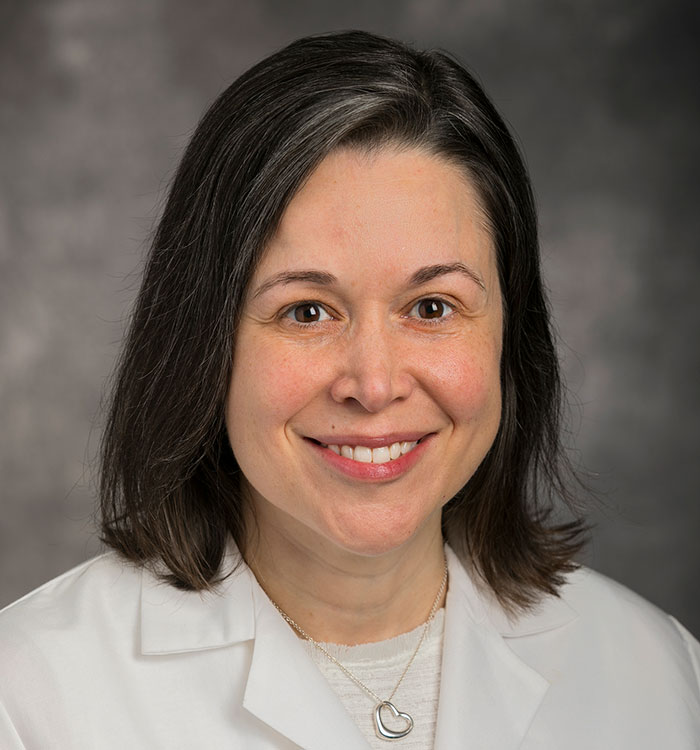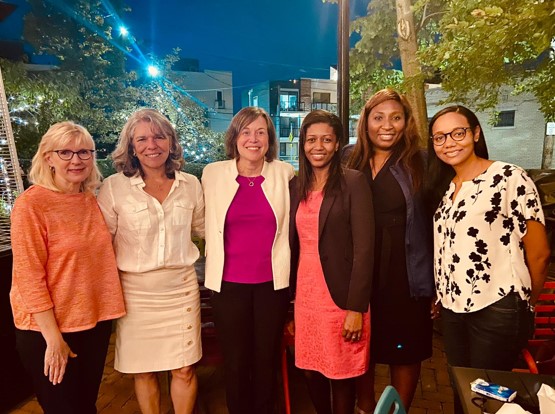WOMEN AS ONE Grant Awarded to University Hospitals Harrington Heart & Vascular Institute for Mentorship of Specialist from Mozambique
November 08, 2022
Grant funds year-long collaboration to improve cardiovascular care at a hospital in Africa
Innovations in Cardiovascular Medicine & Surgery | Fall 2022
Women are under-represented in cardiovascular medicine, vascular medicine, vascular surgery and cardiothoracic surgery – both as providers and in positions of leadership within hospitals and health systems. This is despite research showing that women patients have better cardiovascular outcomes when treated by another woman.
Seeing an opportunity to address this important issue, a physician leader from University Hospitals Harrington Heart & Vascular Institute recently secured grant funding from the relatively new non-profit organization WOMEN AS ONE to mentor a young cardiologist from Mozambique. The year-long mentorship culminated in a two-week, in-depth opportunity for learning and collaboration, hosted by the cardiovascular specialists within University Hospitals Harrington Heart & Vascular Institute, based at University Hospitals Cleveland Medical Center.
International Reach
WOMEN AS ONE was founded in 2019 by two prominent women physicians specializing in cardiovascular care and research. Its mission is to promote talent in medicine, providing women physicians with unique professional opportunities, with the aim of building a more inclusive, diverse and just workforce in medicine. The organization’s Escalator Award program was expanded in 2021 to include mentorship grants for mentors and mentees.
Heather Gornik, MD, Co-Director of the Vascular Center within University Hospitals Harrington Heart & Vascular Institute, and the John B. Lally Family Master Clinician in Fibromuscular Dysplasia and Vascular Care, secured the $25,000 Escalator Award from WOMEN AS ONE and served as mentor for Irina Mbanze, MD, a cardiologist at Maputo Central Hospital, in Maputo, Mozambique, who completed her medical degree in 2019.
 Heather Gornik, MD
Heather Gornik, MDIt was a terrific match, Dr. Gornik says.
“In her relatively short career so far, Dr. Mbanze has made an impact for her patients,” she says. “Despite living in a place with few resources to diagnose and treat patients with cardiovascular diseases, she has been actively involved in campaigns to raise awareness of preventable illness and she has participated in the Pan African Registry of Pulmonary Hypertension and an observational study of sleep disordered breathing in patients with acute heart failure.”
Dr. Mbanze also received an International Training Scholarship Award from the American Thoracic Society in 2015. In 2022, she was one of 22 young cardiologists selected to participate in the first African Course of heart failure, organized by PASCAR, the Pan-African Society of Cardiology, and was one of five cardiologists selected to present projects at the 15th PASCAR Congress in association with the Kenya Cardiac Society.
A Year of Learning
During their year-long collaboration, Dr. Gornik and Dr. Mbanze worked together to develop a 13-session curriculum in Portuguese on cardiology topics, geared for nurses who do not have a background in cardiology. They also collaborated to design a patient registry and to develop a plan to restructure cardiology services at Maputo Central Hospital.
Two weeks in Cleveland at UH Cleveland Medical Center in August allowed Dr. Mbanze to delve into the cardiovascular topics most important to her, especially cardiovascular imaging, heart failure and service line structure, Dr. Gornik says.
“I was just really proud to show our wonderful, world-class cardiovascular program to her,” Dr. Gornik says. “I think she took back a lot of pearls in terms of imaging with echo and advanced modalities. During her time, Dr. Mbanze was also exposed to many different pathologies that she doesn't necessarily see routinely. She was able to observe our operations and generate many ideas about how to structure programs at her hospital. While she was here she started to think about redesigning her outpatient clinic with dedicated rooms based on disease processes similar to our service lines, which came out of spending time in the vascular medicine and heart failure clinics. So I think she took back many things from her time at UH, not just of the disease process and imaging strategies, but also how to organize a cardiovascular service line. Finally, it was wonderful for me to be able to introduce Dr. Mbanze to so many colleague in cardiovascular medicine at UH, including many of our outstanding women cardiologists.”
Dr. Mbanze, too, is enthusiastic about what she gained from the experience.
“This mentorship allowed me to learn how to conduct a small project – how to organize it, proceed according to institution rules and work with colleagues to implement it,” she says. “The context is completely different from developed countries such as the USA. We have limitations in the number of cardiologists, lack of equipment, few nurses working and nurses without training in cardiovascular medicine. We also have a limited data registry, because we still work with paper. But this mentorship was wonderful. During our biweekly Zoom calls, Dr. Gornik and I discussed everything in detail. She helped me to organize every part of the project of improvement of the service where I work, also introducing me to well-known sources of expertise who aided me with the project.”
Growth on Both Sides
Dr. Gornik says she’s eager to mentor other women cardiologists from other parts of the globe through WOMEN AS ONE or other mechanisms and to highlight the advanced capabilities of UH Harrington Heart & Vascular Institute, allowing physicians to take back some of our best practices to their own programs.
 Pictured from left to right: Judith Mackall, MD, Janine Arruda, MD, Heather Gornik, MD, Irina Mbanze, MD, Anene Ukaigwe, MD and Yulanka Castro-Dominguez, MD.
Pictured from left to right: Judith Mackall, MD, Janine Arruda, MD, Heather Gornik, MD, Irina Mbanze, MD, Anene Ukaigwe, MD and Yulanka Castro-Dominguez, MD.Plus, she says, in programs like this, the opportunity for learning and growth goes both ways between mentor and mentee.
“This project in particular was so much fun and such a challenge for me,” she says. “I've been a mentor my whole career to people in various stages of training in cardiology and vascular medicine in North America. But I've never mentored someone internationally in a resource-poor setting. I really learned a lot about practicing cardiology in Africa and the challenges there are there, and the importance of being adaptable and flexible with things that might work here that may or may not work elsewhere, and ways to modify and adapt. I also learned a lot about cardiology in Africa, including the higher prevalence of different disease processes. And honestly, I think I have made a friend for life in Dr. Mbanze. I hope to have a chance to visit her and her colleagues someday to continue the learning and global exchange.”
“It was amazing to work with Dr. Gornik,” Dr. Mbanze adds. “It was impressive how quickly she understood my concerns in each Zoom call and gave me suggestions. Even when I was a little bit sad because of our limitations and staff difficulties, talking to her was always inspiring.”
Dr. Mbanze is also quick to point out leaders in Africa who helped make this mentorship possible.
“I’m deeply grateful to Professor Karen Sliwa, who was my mentor in the first African heart failure course and advised me to apply to WOMEN AS ONE award, the leaders of WOMEN AS ONE who allowed a young cardiologist from a low-income country to be able to learn directly from well-known experts in cardiovascular medicine in the world, and to my local leaders Albertino Damasceno and Domingos Diogo, who always supported me,” she says.
“This mentorship showed me that we can always be better than yesterday,” she adds. “I will keep forever in my mind the human qualities of Dr. Gornik, who was always very kind with everyone and always ready to teach and help others. The respect that her colleagues have for her was clear, and the resulting teamwork was amazing. I hope to be able to keep learning from Dr. Gornik and her UH colleagues and step by step contribute to the improvement of healthcare of the cardiac patients in my country.”
Contributing Experts:
Heather Gornik, MD
Co-Director, Vascular Center and
John B. Lally Family Master Clinician in Fibromuscular Dysplasia and Vascular Care
University Hospitals Harrington Heart & Vascular Institute
Professor, Case Western Reserve University School of Medicine
Irina Mbanze, MD
Cardiologist
Maputo Central Hospital
Maputo, Mozambique


